|
|
|
Sort Order |
|
|
|
Items / Page
|
|
|
|
|
|
|
| Srl | Item |
| 1 |
ID:
143474


|
|
|
|
|
| Publication |
Massachusetts, Center for International Studies, 1980.
|
| Description |
67p.pbk
|
|
|
|
|
|
|
|
|
|
|
|
Copies: C:1/I:0,R:0,Q:0
Circulation
| Accession# | Call# | Current Location | Status | Policy | Location |
| 023133 | 330.95195/GRI 023133 | Main | On Shelf | General | |
|
|
|
|
| 2 |
ID:
077963
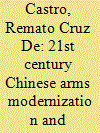

|
|
|
| 3 |
ID:
148162
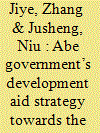

|
|
|
|
|
| Summary/Abstract |
Since 1977 with the application of the Fukuda Doctrine to Southeast Asia, successive Japanese governments have continued a regional strategy of development aid. When Japan’s massive aid in the 1980s-1990s transferred Japanese manufacturing to Thailand under the“Flying Geese”paradigm intended to help developing countries catch up with developed ones, it was the major external factor in Thailand’s economic take-off and contributed to post-Cold War domestic stability in neighboring Laos, Cambodia and Vietnam. Beneficiaries of Japanese development aid, these countries introduced policies of reform and opening to the outside world. The Greater Mekong Subregional Cooperation Projects supported by Asian Development Bank (ADB) were at the hub of that progress.
|
|
|
|
|
|
|
|
|
|
|
|
|
|
|
|
| 4 |
ID:
082903
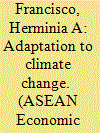

|
|
|
|
|
| Publication |
2008.
|
| Summary/Abstract |
This paper focuses on the adaptation strategies of developing countries and the possible adaptation options available for Southeast Asia. Adaptation refers to the actions taken by individuals, communities, or governments in response to climate change, to reduce the adverse impacts or to take advantage of opportunities offered by such changes. Adaptation strategies have hardly been considered by many Southeast Asian countries in as recently as two or three years ago. The cost of adaptation and the funding available is also discussed, with the possibility of using institutions for risk sharing (disaster management) and risk transfer (insurance and derivatives) as measures to adapt. A regional outlook for adaptation for Southeast Asia concludes the paper
|
|
|
|
|
|
|
|
|
|
|
|
|
|
|
|
| 5 |
ID:
053169
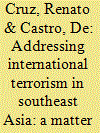

|
|
|
| 6 |
ID:
143894


|
|
|
|
|
| Summary/Abstract |
The deterioration of Russia’s relations with the West over the Crimea in 2014, and the ongoing crisis in the Ukraine, has led to a new emphasis on the Asia Pacific in the country’s foreign policy. However, it remains a matter of debate whether Russia’s “pivot to the East” represents a fundamental strategic shift or merely a tactical geopolitical manoeuver. In addition, it remains open to question whether Russia’s Asian pivot encompasses countries across the region other than just China which remains at the heart of the Kremlin’s Asia-Pacific policy. This article examines Southeast Asia in current Russian foreign policy and strategic thinking, assesses Russia’s stance towards the region with regard to bilateral ties and multilateral mechanisms and presents an outline of the future development of Russia’s engagement with Southeast Asia. The arguments put forward in the article suggest that Southeast Asia is at least secondary to China within the Asian pivot, while the pivot itself is at least secondary within Russia’s overall foreign policy. The main value of Southeast Asia for Moscow lies in its image-building strategy, with the West as the primary audience. We can therefore assume that there is unlikely to be any groundbreaking developments in Russia’s relations with Southeast Asia for the foreseeable future, although the former will welcome cooperative initiatives from the latter.
|
|
|
|
|
|
|
|
|
|
|
|
|
|
|
|
| 7 |
ID:
059155
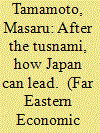

|
|
|
|
|
| Publication |
Jan-Feb 2005.
|
|
|
|
|
|
|
|
|
|
|
|
|
|
|
|
| 8 |
ID:
157408
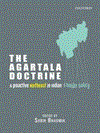

|
|
|
|
|
| Publication |
New Delhi, Oxford University Press, 2016.
|
| Description |
xvi, 344p.: tables, figureshbk
|
| Standard Number |
9780199463800
|
|
|
|
|
|
|
|
|
|
|
|
Copies: C:1/I:0,R:0,Q:0
Circulation
| Accession# | Call# | Current Location | Status | Policy | Location |
| 059303 | 327.54/BHA 059303 | Main | On Shelf | General | |
|
|
|
|
| 9 |
ID:
134217
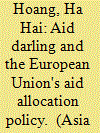

|
|
|
|
|
| Publication |
2014.
|
| Summary/Abstract |
This paper analyses the motivation determining the European Union's (EU) aid allocation to Vietnam. Existing literature and EU official documents are used to build upon four models with respect to new aid allocation: donor interest, recipient interest, recipient capacity and potential donor influence. The paper concludes that the EU's aid policy in Vietnam has a long-term objective in conformity with Vietnam's development strategy-poverty alleviation. Moreover, the EU's political and economic interests, a successful economic reform and development strategy, a high level of ownership (good governance) and potential donor influence are identified as contributions to make Vietnam an 'aid darling'.
|
|
|
|
|
|
|
|
|
|
|
|
|
|
|
|
| 10 |
ID:
075420
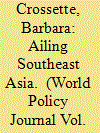

|
|
|
| 11 |
ID:
000416
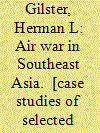

|
|
|
|
|
| Publication |
Alabama, Air University Press, 1993.
|
| Description |
xiii, 138p.pbk
|
|
|
|
|
|
|
|
|
|
|
|
Copies: C:1/I:0,R:0,Q:0
Circulation
| Accession# | Call# | Current Location | Status | Policy | Location |
| 041644 | 959.704348/GIL 041644 | Main | On Shelf | General | |
|
|
|
|
| 12 |
ID:
080905
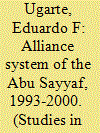

|
|
|
|
|
| Publication |
2008.
|
| Summary/Abstract |
Unsettled conditions on Jolo and Basilan islands in the southwestern Philippines have seriously hampered efforts to obtain information about the Abu Sayyaf. The result has been a continuing ignorance over the most fundamental features of the group. In the attempt to broaden our understanding of its structure, this article examines data drawn from an array of sources in light of the authoritative work of Thomas Kiefer on the traditional Tausug alliance system on Jolo. It argues that the Abu Sayyaf consists of a system of alliance groups of the kind customarily found in Muslim Filipino societies
|
|
|
|
|
|
|
|
|
|
|
|
|
|
|
|
| 13 |
ID:
142540
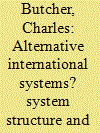

|
|
|
|
|
| Summary/Abstract |
Were precolonial state systems different to the European model? If so, how did these state systems vary, and do variations in system structure influence the frequency of war? In this article we assess the structure off international systems in nineteenth-century West Africa, Southeast Asia, and South Asia using new data on precolonial states that corrects for some of the biases in the existing Correlates of War state system membership data. We develop a framework to capture variation in political order above and below the state, and explore the similarities and differences between these systems and the European system we know and study. We then assess how rates of inter- and intra-state war varied across these systems. Our results suggest: (1) It is the nature of hierarchy (not so much anarchy) that varies across these systems; and (2) inter-state wars are more frequent, but less intense, in systems composed of decentralised states.
|
|
|
|
|
|
|
|
|
|
|
|
|
|
|
|
| 14 |
ID:
052488
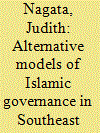

|
|
|
|
|
| Publication |
June 2004.
|
| Summary/Abstract |
In the prevailing political world order, sovereign nation-states and secular political authority widely face competition from transnational religious communities, whose authority and agendas derive from different principles. This is particularly evident in Islam, where ulama may acquire political power, while governments appropriate religious interpretations to their own purposes, and even determine who is orthodox or heretical in their domain. This article focuses on the origins and spread of one Malay Islamic movement, Al Arqam, inspired by a rare mix of global Sufi and strict Shari'ah traditions, many of whose members were organized into residential communes and institutions promoting economic independence, mutual support, social service and extensive mission. With their schools, clinics, farms and factories, this amounted to an experiment in alternative development and governance, although not explicitly as an Islamic state. Arqam's moral example and its success in recruiting technically skilled, highly educated young Malays, however, was perceived by the Malaysian government, as its own loss, and a threat to its legitimacy, and the movement was eventually banned. Through this non-violent ideological confrontation, Arqam became de facto political, as well as a 'heresy', in this local understanding of 'political Islam'.
|
|
|
|
|
|
|
|
|
|
|
|
|
|
|
|
| 15 |
ID:
181188


|
|
|
|
|
| Summary/Abstract |
US Vice President Kamala Harris and Secretary of Defense Lloyd J. Austin III have made significant official visits to Southeast Asia. Both sought to address concerns that the US had paid insufficient attention to the region during President Joe Biden's early months in office. But they left unanswered substantial questions about future US strategy as to both the Asia-Pacific as a whole and Southeast Asia in particular. This underlined doubts about Washington's ability to create and develop the kind of regional initiatives, institutions and partnerships that might help to blunt China's rise and draw nations in Southeast Asia back towards the US. To do so, the US will have to marshal deep focus and subtle statecraft to create new diplomatic architecture and set new standards for the region in areas such as trade and new technologies. Otherwise, American influence in the region is likely to decline.
|
|
|
|
|
|
|
|
|
|
|
|
|
|
|
|
| 16 |
ID:
121864
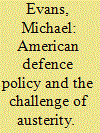

|
|
|
|
|
| Publication |
2013.
|
| Summary/Abstract |
This article examines the Obama administration's attempt to rebalance U.S. strategy towards the Asia-Pacific region with special emphasis on Southeast Asia. It argues that America's regional pivot is occurring at a time of unprecedented domestic fiscal austerity caused by a staggering level of national debt. The U.S. domestic budget crisis, the current "declinist" debate, concern over the rise of China, and the impact of sequestration on American defence spending are analysed and their implications for Southeast Asia are assessed. The article suggests that the most serious aspect of the U.S. debt crisis may be its impact upon American strategic resilience and geopolitical confidence. Thus, while many ASEAN nations have welcomed the U.S. strategic pivot as a valuable reinforcement of their security, they remain unsure that it is a sustainable policy. In the future, it is likely that reassuring ASEAN of the longevity of the U.S. commitment to the Asia-Pacific will require of Washington a skilled blend of budgetary reform, military presence, and sustained diplomatic effort.
|
|
|
|
|
|
|
|
|
|
|
|
|
|
|
|
| 17 |
ID:
130843
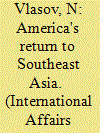

|
|
|
|
|
| Publication |
2014.
|
| Summary/Abstract |
The article examines U.S. foreign relations with Southeast Asia. An increase in U.S. involvement in the region under the administration of President Barack Obama is considered. A contradiction in U.S. policy is said to exist between insistence by the administration that its desire for stability and freedom of the seas in Southeast Asia is not intended as containment of China and China's aggressive maritime boundary claims in the South China Sea.
|
|
|
|
|
|
|
|
|
|
|
|
|
|
|
|
| 18 |
ID:
055465


|
|
|
| 19 |
ID:
069036
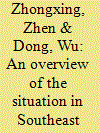

|
|
|
| 20 |
ID:
092521
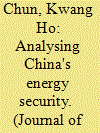

|
|
|
|
|
|
|
|